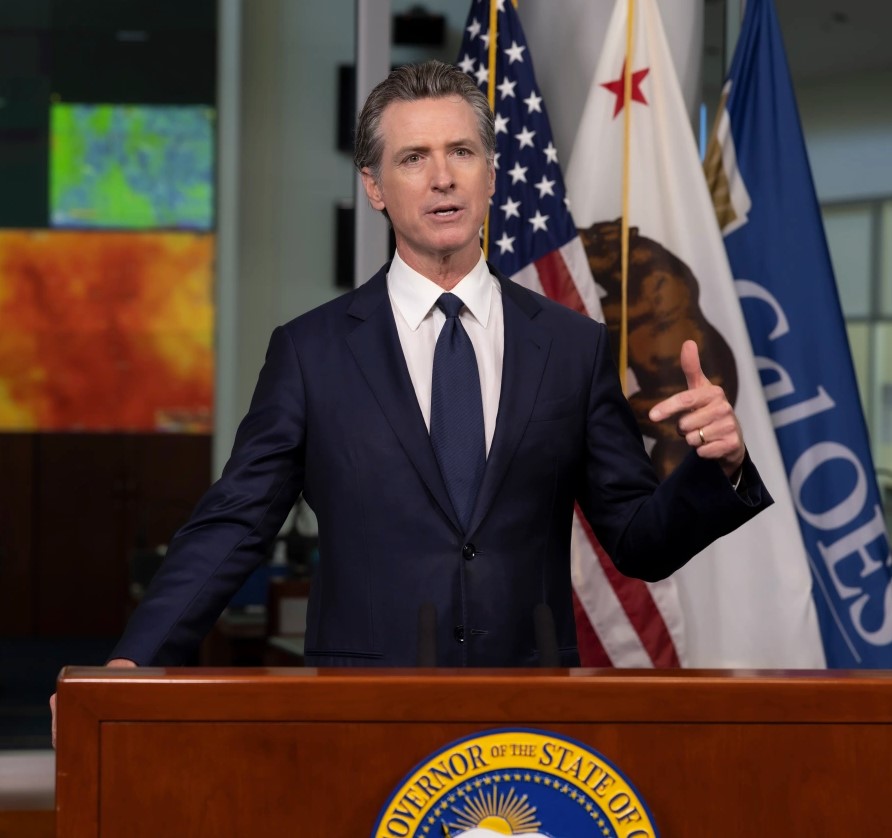
Governor Gavin Newsom has until the end of September to sign or veto bills. On August 31, he asked the state to use flex alerts in the afternoon to conserve energy, during the on heat wave.
The California legislative session is over, and Governor Gavin Newsom has until the end of September to either sign or veto bills. Circling the News invites readers to pick their favorite “possible” new law.
BOOSTING PAID FAMILY LEAVE:
Senate Bill 951 would increase payments to workers from the state’s disability and paid family leave programs. Starting in 2025, workers who earn less than about $27,000 a year would be paid 90% of their regular wages, an increase from the current 70%. The bill would offset some of these costs by removing a cap on workers’ contributions to the program, which currently shields earnings above $145,600.
 FAST FOOD WORKER’S SALARIES:
FAST FOOD WORKER’S SALARIES:
Assembly Bill 257 would create a state-run council to set labor standards across the fast foot sector. The council would be allowed to raise the minimum hourly wage to as high as $22/hour by the end of 2023. The current minimum wage in California is $15/hour for employers with 26 or more employees, and $14/hour for employers with 25 or less.
BUILD HOUSING ON STRIP MALLS:
Assembly Bill 2011 would fast-track housing development along strip malls. It would be allowed to skip CEQA, if apartments are either 100 percent affordable or mixed-use.
Senate Bill 6 would allow housing on commercial real estate provide if developers use at least some union labor on every project. Both bills would take away local control over projects.
KIDS PRIVACY ONLINE:
Assembly Bill 2276 would be a first-in-the-nation law requiring broad privacy protections online for children under 18, starting in 2024.
 INTERIM GOALS FOR 100 PERCENT CLEAN ENERGY:
INTERIM GOALS FOR 100 PERCENT CLEAN ENERGY:
Senate Bill 1020, authored by state Sen. John Laird, sets interim targets for generating clean energy. The current law already requires 100% of retail electricity to be fueled by renewables such as wind and solar by 2045. This change requires 90% by 2035 and 95% by 2040. In addition, all state agencies must source their energy from 100% renewable sources by 2035, ten years sooner than the current law requires.
COVID DISINFORMATION:
Assembly Bill 2098 would make it easier for the Medical Board of California to punish doctors who deliberately spread false information about COVID-19, vaccines and treatments. The bill, authored by Cupertino Democrat Evan Low, would classify disinformation as “unprofessional conduct,” allowing the board to take action. Discipline could include a public reprimand, probation, suspension, or license revocation.
CLEARING CRIMINAL RECORDS:
Senate Bill 731 would, as of July 1, expand criminal record relief for all felonies, not just jailable felonies, if an individual is no longer serving a probationary sentence, not currently involved in another case, and two years have elapsed. The bill does not exclude violent criminals, and law enforcement and medical groups oppose the bill.
NURSING HOME LICENSING REFORM:
Assembly Bill 1502 would close loopholes that prevent people from purchasing nursing homes before they have a license to run them. Advocates on both sides of the bill have for years called for reform of the licensing system. They want to see better state oversight of who owns and operates nursing homes in the state.
EASIER FARMWORKER UNIONIZATION:
Assembly Bill 2183 would allow farmworker to vote in union elections by mail, rather than the current in-person election system.
STUDENT HOUSING VERSUS CEQA:
Senator Scott Weiner authored Senate bill 886, which would excuse public college and university housing regulations from the California Environmental Quality Act (CEQA).
 LIMITING SOLITARY CONFINEMENT:
LIMITING SOLITARY CONFINEMENT:
Assembly Bill 2632 would not allow prisoners to be held in solitary for longer than 15 consecutive days, or 45 days in a 180-day period. The bill would also prohibit the California Department of Corrections and Rehabilitation from putting certain groups in solitary confinement, including inmates younger than 26 or older than 59, pregnant people or those with mental or physical disabilities. (Editor’s note: the only “people” who can carry a baby are biologically female—but that person can identify however they want and use whatever pronouns they choose.)
FEWER REMEDIAL COURSES AT COMMUNITY COLLEGE:
Assembly Bill 1705 wants more community college students to enroll in classes that transfer to a UC or Cal State campus, doing away with the remedial math and English. Following a 2017 change in the law, most students started taking gateway courses to eventually get into a UC or CSU, but still thousands — about 20 percent of first-time students — still take remedial courses.
CELL FEE TO FUND 988 CRISIS HOTLINE:
Assembly Bill 988 would raise funds to support call centers and mobile crisis teams associated with 988, the new three-digit federal mental health crisis hotline. In July, the new federal 988 number debuted across the country. The number, billed as an alternative to 911, is intended to make it easier for mental health emergencies. But to build out the system, proponents of the cell phone fee say the state needs ongoing funding.
 HUMAN COMPOSTING – ENVIRONMENTALLY FRIENDLY:
HUMAN COMPOSTING – ENVIRONMENTALLY FRIENDLY:
And you thought that coffee grounds were the only thing good for the soil? Assembly Bill 351 would legalize natural organic reduction, aka turning bodies into soil after death.
The National Funeral Directors Association estimates that about 67 percent of people were cremated in 2021. Cremating one corpse can release almost 600 pounds of carbon dioxide into the atmosphere. Supporters of the bill say if each Californian opted to be composted after death, the carbon saved would be enough to power 225,000 homes for a year. It would take effect in 2027.
Ten states have a full-time legislature: Alaska, California, Hawaii, Illinois, Massachusetts, Michigan, New York, Ohio, Pennsylvania and Wisconsin. That means that in 40 states, legislators meet part-time and seem to be doing well. Maybe its time for California to go part-time?
But then, how could California residents do without a law about introducing rap lyrics at a trial?
See if Newsom signs Assembly bill 2799. Based on the book “Rap on Trial,” a study showed people were read identical song lyrics, but half were told they were from a country song and half were told they were rap. Participants in the study rated the rap lyrics more offensive—which means according to the bill, jury would be more likely to convict someone if rap lyrics or other artistic expression are relevant to the case.

A rapper is on trial for murder in Atlanta. The prosecution is using his lyric to show that he believes in murder.. What about when Johnny Can sang I shot a man in Reno, or I Shot the Sheriff . What if Jackie Gleason were accused of domestic abuse for threatening to hit Alice. While you push your snarkiness, it is a racial and artistic free speech issue. A Google search could have educated you.
Dear God, we’re doomed.